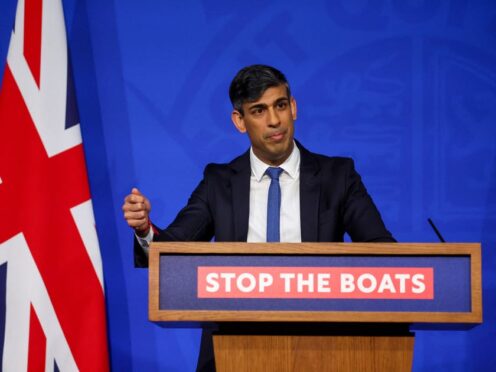
Senior figures from the United Nations and the Council of Europe have condemned Prime Minister Rishi Sunak’s plan to send asylum seekers to Rwanda after Parliament passed legislation to give the scheme the green light.
The Safety of Rwanda (Asylum and Immigration) Bill, which aims to deter migrants from seeking to cross the English Channel, passed in the early hours of Tuesday after disagreements resulted in a lengthy “ping-pong” between the two Houses.
Filippo Grandi, the UN high commissioner for refugees, called on Mr Sunak to reconsider the plan, which he said sets a “worrying global precedent”.
The “Safety of Rwanda” bill was passed by the UK Parliament: both @UNHumanRights and UNHCR are very concerned by this decision, which breaches refugee law and won’t help address the challenges of irregular population movements.
Read our joint statement: https://t.co/eVTf4DBpvz
— Filippo Grandi (@FilippoGrandi) April 23, 2024
Mr Grandi said the arrangement with Rwanda seeks to shift responsibility for refugee protection, undermining international co-operation, and that the legislation marks a breach of the Refugee Convention.
Volker Turk, the UN high commissioner for human rights, said it “seriously hinders the rule of law in the UK and sets a perilous precedent globally”.
The move reduces the ability of the UK’s courts to scrutinise removal decisions, restricts access to legal remedies in the UK and limits human rights protections for a specific group of people internationally and domestically, Mr Turk said.
“It is critical to the protection of the human rights and dignity of refugees and migrants seeking protection that all removals from the UK are carried out after assessing their specific individual circumstances in strict compliance with international human rights and refugee law.”
Council of Europe human rights commissioner Michael O’Flaherty urged the UK not to remove refugees under the policy and said the adoption of the Rwanda Bill “raises major issues about the human rights of asylum seekers and the rule of law more generally”.
I have serious #HumanRights concerns about United Kingdom’s #RwandaBill. Its adoption by the UK Parliament raises major issues about the rights of #asylum seekers and the #RuleOfLaw.👉 https://t.co/wPSmmMlTBw pic.twitter.com/9iSFgdZs0d
— Commissioner for Human Rights (@CommissionerHR) April 23, 2024
Mr O’Flaherty said he was concerned that the Bill enables a policy of removing people to Rwanda without UK authorities assessing their asylum claims in most cases.
He also called on the Government to reverse the Bill’s “effective infringement of judicial independence”.
The Supreme Court ruled in November last year that the Rwanda policy was unlawful, saying there was a real risk that genuine refugees could be sent back to their country of origin and face ill treatment.
The legislation overrides this ruling and declares Rwanda a safe country.
The European Court of Human Rights, an institution of the Council of Europe, blocked deportation flights to Rwanda in 2022.
Mr Sunak has insisted he will not let this happen again.
Downing Street rejected the criticism.
“We have said repeatedly that we believe that, yes, this is some of the toughest legislation ever enacted, but it is also compliant with our international obligations,” a No 10 spokeswoman said.
Asked if the Council of Europe’s criticism could prejudice any European Court of Human Rights cases, the spokeswoman said: “The Prime Minister has spoken many times about the compliance of the legislation, that it addresses the issues that were raised by the Supreme Court.
“And he’s also spoken many times about the importance of putting this in place and is always happy to restate that.”
Preparations for the first flights to Rwanda are due to begin within days, with asylum seekers who could be relocated being identified and potentially detained.
Charter planes are expected to leave for Rwanda in 10-12 weeks, with Mr Sunak promising “multiple flights a month”, although ministers conceded numbers being sent to Kigali will be small at first.
Some £290 million has already been committed to the Rwanda scheme, with a further £100 million earmarked over the next two years.

Enjoy the convenience of having The Sunday Post delivered as a digital ePaper straight to your smartphone, tablet or computer.
Subscribe for only £5.49 a month and enjoy all the benefits of the printed paper as a digital replica.
Subscribe